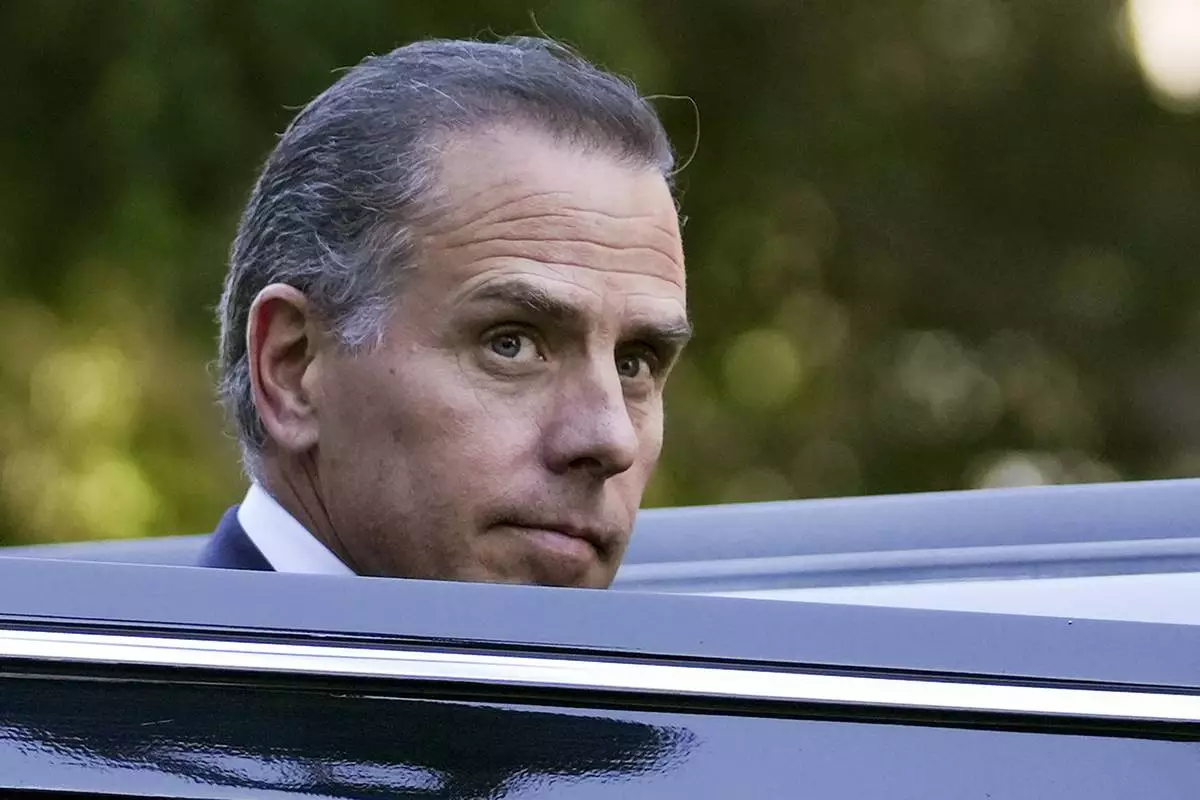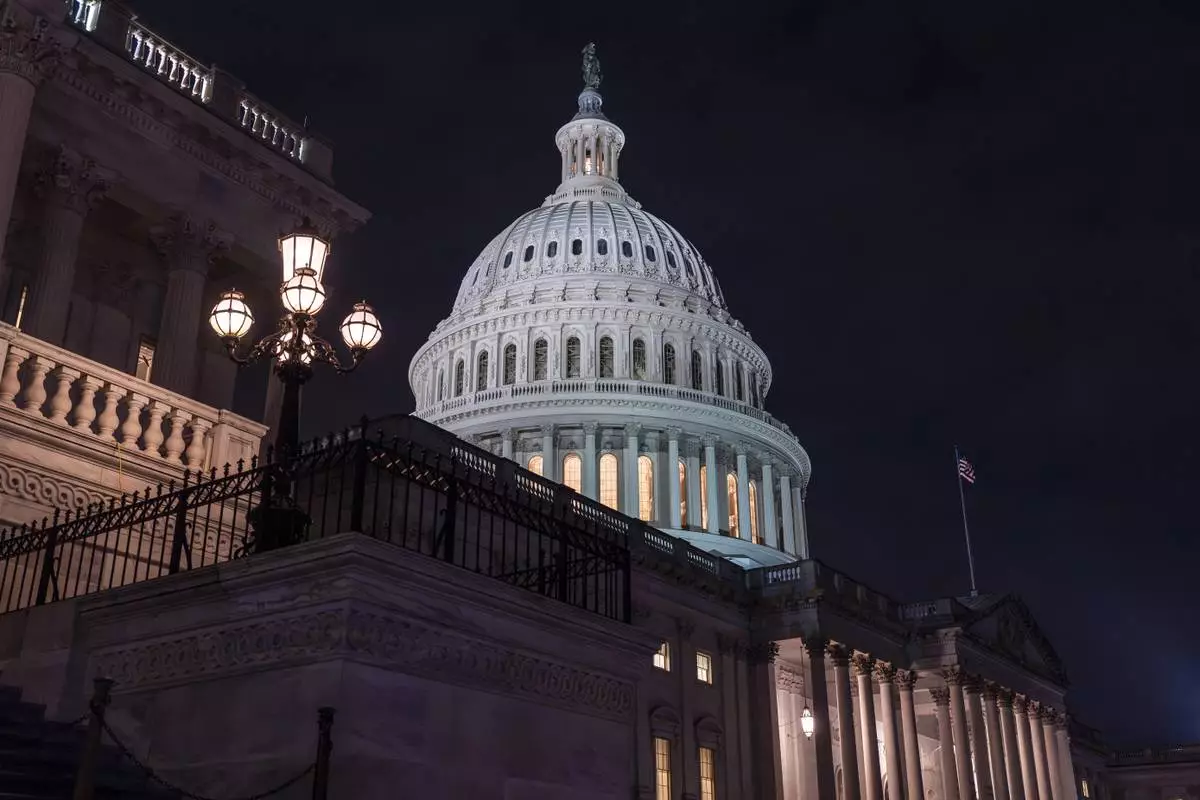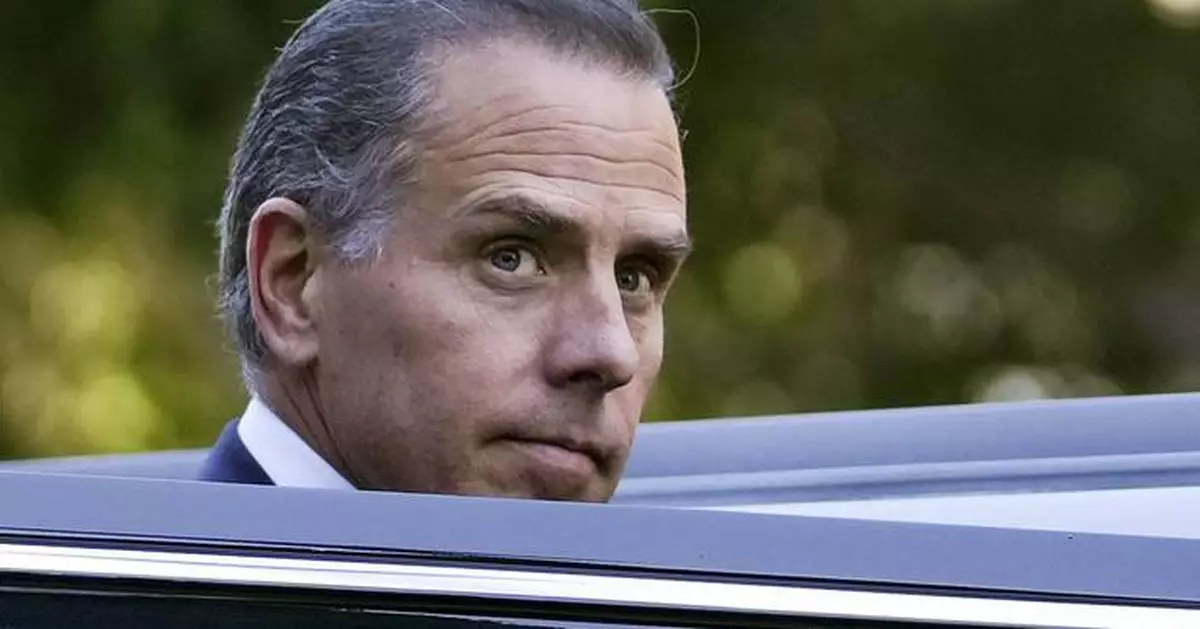WILMINGTON, Del. (AP) — Hunter Biden will be sentenced on felony firearms charges in December after the judge agreed Thursday to a delay requested by the defense.
In June, President Joe Biden 's son was convicted in Delaware federal court of three felonies for purchasing a gun in 2018 when, prosecutors said, he lied on a federal form by claiming he was not illegally using or addicted to drugs.
He was initially scheduled to be sentenced on Nov. 13, but the judge agreed to delay the hearing until Dec. 4 after Hunter Biden's lawyers said they needed more time to adequately prepare.
The gun charges are punishable by up to 25 years in prison, though he will likely face far less time behind bars or possibly avoid imprisonment entirely.
He also faces sentencing in California on Dec. 16 on federal tax charges he pleaded guilty to earlier this month. Those charges carry up to 17 years behind bars. He also faces up to $1.35 million in fines.
President Biden, who dropped his reelection bid in July, has said he will not use his presidential powers to pardon his son or lessen his sentence.
After his guilty plea on the tax charges, Hunter Biden said he wanted to spare his family another painful ordeal after his gun trial aired salacious and embarrassing details about a time in which struggled with a crack cocaine addiction. Hunter Biden said he's been sober since 2019.
“I will not subject my family to more pain, more invasions of privacy and needless embarrassment,” Hunter Biden previously said. “For all I have put them through over the years, I can spare them this, and so I have decided to plead guilty.”

Hunter Biden steps into a vehicle as he leaves federal court, Thursday, Sept. 5, 2024, in Los Angeles, after pleading guilty to federal tax charges. (AP Photo/Eric Thayer)
WASHINGTON (AP) — The Senate passed legislation early Saturday to boost Social Security payments for millions of people, pushing a longtime priority for former public employees through Congress in one of its last acts for the year.
The bipartisan bill, which next heads to President Joe Biden, will eliminate longtime reductions to Social Security benefits for nearly 3 million people who receive pensions from work in federal, state and local government, or public service jobs like teachers, firefighters and police officers. Advocates say the Social Security Fairness Act rights a decades-old disparity, though it will also put further strain on Social Security Trust Funds.
The legislation has been decades in the making but the push to pass it came together in the final weeks — and was completed in the final minutes — that lawmakers were in Washington before Congress resets next year. All Senate Democrats, as well as 27 Republicans, voted for the bill, giving it a final tally of 76-20.
“Millions of retired teachers and firefighters and letter carriers and state and local workers have waited decades for this moment. No longer will public retirees see their hard-earned Social Security benefits robbed from them,” said Senate Majority Leader Chuck Schumer, D-N.Y.
The bill repeals two provisions — the Windfall Elimination Provision and the Government Pension Offset — that limit Social Security benefits for certain recipients if they receive retirement payments from other sources such as the public retirement program for a state or local government.
“Social Security is a bedrock of our middle class. It’s retirement security that Americans pay into and earn over a lifetime," said Sen. Sherrod Brown, an Ohio Democrat who has pushed for the proposal for years and will leave Congress after losing reelection.
He added that the current restrictions make “no sense. These workers serve the public. They protect our communities. They teach our kids. They pay into Social Security just like everyone else."
People who currently have reductions in their Social Security benefits under the exceptions would soon see a boost in their monthly payments. But those increased payments would also add an estimated $195 billion to federal deficits over 10 years, according to the Congressional Budget Office.
Social Security Trust Funds were already estimated to be unable to pay out full benefits beginning in 2035, and the change will hasten the program’s insolvency date by about half a year. A typical dual-income couple retiring in 2033 would see an additional $25,000 lifetime reduction in their benefits, according to the nonpartisan Committee for a Responsible Federal Budget.
Many of the bill's opponents acknowledged that the current reductions are not fair to public service retirees, but said they could not support the bill when the entire program faces challenges.
“We caved to the pressure of the moment instead of doing this on a sustainable basis,” said Sen. Thom Tillis, a North Carolina Republican who opposed the bill.
The policy changes will also heap more work on the Social Security Administration when the agency is already at its lowest staffing level in 50 years. The agency currently has a staff of about 56,400 — the lowest level since 1972, according to an agency spokesperson — even as it serves more people than ever. The stopgap government funding bill that also passed early Saturday did not include increased funding for the agency, which is currently in a hiring freeze.
Still, Republican supporters of the bill said there was a rare opportunity to address what they described as an unfair section of federal law that hurts public service retirees.
“They have earned these benefits. This is an unfair, inequitable penalty,” said Sen. Susan Collins, a Maine Republican.
GOP supporters of the bill also said they would return to work on larger fixes to Social Security. President-elect Donald Trump, however, has said he will not touch the benefits, even as his administration looks to make deep budget cuts elsewhere.
Senate Republicans are nonetheless working on ideas that would put the program on better financial footing, but also inevitably require a scale-back in benefits. One fiscal hawk, Sen. Rand Paul, pushed Friday for a proposal to gradually raise the Social Security retirement age to 70, although a vote to add that provision to the bill only received three votes in favor of it.
“There's so much riding on us getting this right and having the courage to fix Social Security over the next few years,” Tillis said. “We will rue the day that we failed to do it.”

The Capitol is pictured in Washington, Friday, Dec. 20, 2024. (AP Photo/J. Scott Applewhite)











